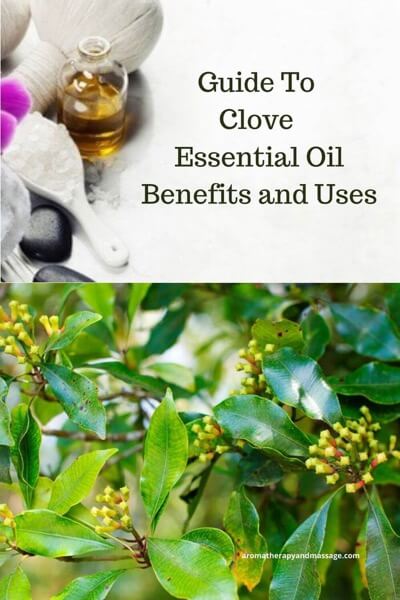- Home
- Essential Oil Profiles
- Clove Essential Oil
As an affiliate for Bookshop, Amazon, and other programs, I may earn a small commission for products purchased through links. This doesn't affect the price you pay. Privacy policy and disclosures.
Search this site:
Guide to Clove Essential Oil Benefits and Uses
"Stirring the spirit, clove has no time for contemplation, only for action," writes aromatherapist Valerie Ann Worwood in Aromatherapy For the Soul. She also says the emotional benefits of clove essential oil (Syzygium aromatica or Eugenia caryophyllata) are to encourage inspiration, trust, inner warmth, stimulation, and regeneration.
Basic Clove Facts
This profile applies primarily to clove bud essential oil, which is the type of clove most commonly recommended in aromatherapy. However, clove leaf or clove stem oil are also available. Clove bud oil is sometimes mixed with the leaf or stem oil or with the chemical component eugenol, so know what you are buying and buy from a trusted source.
Plant family: Myrtaceae
Production: Clove bud oil is steam distilled from the immature flower buds.
Aroma: Spicy, warm.
Perfume/Aromatic note: Top.
Is clove safe to use during pregnancy? Most sources say no.
Is
clove essential oil safe for children? Do not use with children under
age 2. Clove oil must be highly diluted for children and may not be
appropriate for sensitive kids.
Cautions: Clove essential oil may irritate the skin and mucous membranes. Various sources specify a maximum skin use level between 0.5% and 1.0%. Clove may have a possible drug interaction and may inhibit blood clotting.
Main components of clove bud oil:
- eugenol 73.5–96.9%
- beta-caryophyllene 0.6–12.4%
- eugenol acetate 0.5–10.7%
Source: Essential Oil Safety, 2nd Edition
Clove Essential Oil Benefits
Aromatherapy: A Complete Guide to the Healing Art: Clove is a popular remedy for tooth pain. Many commercial dental care products contain this essential oil because it kills mouth bacteria. Clove may help digestion and ease nausea. The oil is also useful for colds and flu and may slow the formation of blood clots. You can dab highly diluted clove oil on scabies, warts, athlete's foot, and fever blisters. A small amount of the oil is stimulating and can help relieve, nervousness, mental fatigue, or poor memory.
The Complete Book of Essential Oils and Aromatherapy: Uses for clove essential oil include pain relief, especially toothache, muscle pain, and rheumatism. The oil may also help relieve gum disease, flu, bronchitis, tired limbs, nausea, flatulence, stomach cramps, scabies, ringworm, and warts.
The Encyclopedia of Essential Oils (updated edition): You can use clove for acne, athlete's foot, bruises, toothache, arthritis, rheumatism, sprains, asthma, bronchitis, colic, indigestion, nausea, colds, flu, and minor infections. The oil also works as a mosquito repellent.
Aromatica: A Clinical Guide to Essential Oil Therapeutics, Volume I: Psychologically, clove bud promotes motivation, self-confidence, strength, stability, and integration. Physically, the essential oil stimulates and warms weak/cold conditions and hypotonic/weak conditions. In Traditional Chinese Medicine the essential function of the oil is to tonify the Yang, warm the interior, and strengthen the Shen.
- The rasa (taste) of clove is pungent, the vipaka (aftertaste) is pungent, and the virya (energy) is heating.
- The oil decreases vata and kapha and increases pitta.
- Tissues most affected by the oil are plasma, muscle, marrow, nerve, and reproductive.
- Indications for this essential oil include colds, coughs, indigestion, toothache, hiccups, laryngitis, low blood pressure, and impotence.
- Do not use the oil in the presence of high pitta.
Marma Points of Ayurveda adds that this oil relieves pain, decongests and loosens mucus, and can improve digestion when applied to the abdomen. Clove has an affinity for the nervous system.
The Essential Guide to Aromatherapy and Vibrational Healing: Spiritually, clove helps protect you from ill wishes and negative energy from your own thoughts and also enhances creative visualization techniques. Mentally, the essential oil is stimulating and uplifting and improves your ability to think clearly. Emotionally, the oil relieves the blues and symptoms of depression and strengthens self-confidence.
Aromatherapy and Subtle Energy Techniques: Clove strengthens and promotes action. The oil is especially useful for the third chakra to promote courage, action, self-control, and achievement and to strengthen personal will.
Mixing Essential Oils for Magic: Clove banishes negative energy and entities. The oil increases magical powers, stimulates the mind, and promotes psychic awareness. Use the oil to attract love, money, prosperity, and luck.
Clove Essential Oil Uses and Blends
During the fall/winter holidays, diffuse a blend of clove and orange essential oils to create a holiday scent. You can also add cinnamon essential oil to the diffuser blend.
To use clove for toothaches, dilute the essential oil in an edible oil (such as olive). Use a cotton swab to apply a little of the blend around the painful area. If the blend burns too much, dilute it more. Repeat several times a day until you can see a dentist.
Athlete’s Foot Soak Blend
- 5 drops clove essential oil
- 5 drops tea tree essential oil
- 3 drops lavender essential oil
- 2 drops thyme essential oil
- 1/4 cup Epsom or sea salt
- Stir the essential oils into the salt.
- Stir the salt blend into a comfortably hot foot bath.
- Soak your feet 15 to 20 minutes.
- Dry your feet.
- Add 1 drop tea tree oil to 10 drops carrier lotion. Apply this blend directly to the area where you have the athlete's foot fungus.
- Keep your feet open to air as much as possible.
- Repeat this procedure every day for three to six weeks. If you must skip the soak on any day, still apply tea tree oil.
Make sure you wash your hands after touching the affected area.
Adapted from The Essential Oils Complete Reference Guide
Wake Up Mist Spray
- 45 drops clove bud essential oil
- 30 drops rosemary essential oil
- 30 drops peppermint essential oil
- 55 drops orange essential oil
- 4 ounces (1/2 cup) distilled water
Blend ingredients in a glass spray bottle. Shake vigorously. Shake well before every use.
Source: Rocky Mountain Oils
Buy essential oils: Aromatics International or Rocky Mountain Essential Oils.
Photo Credit: 123rf.com




